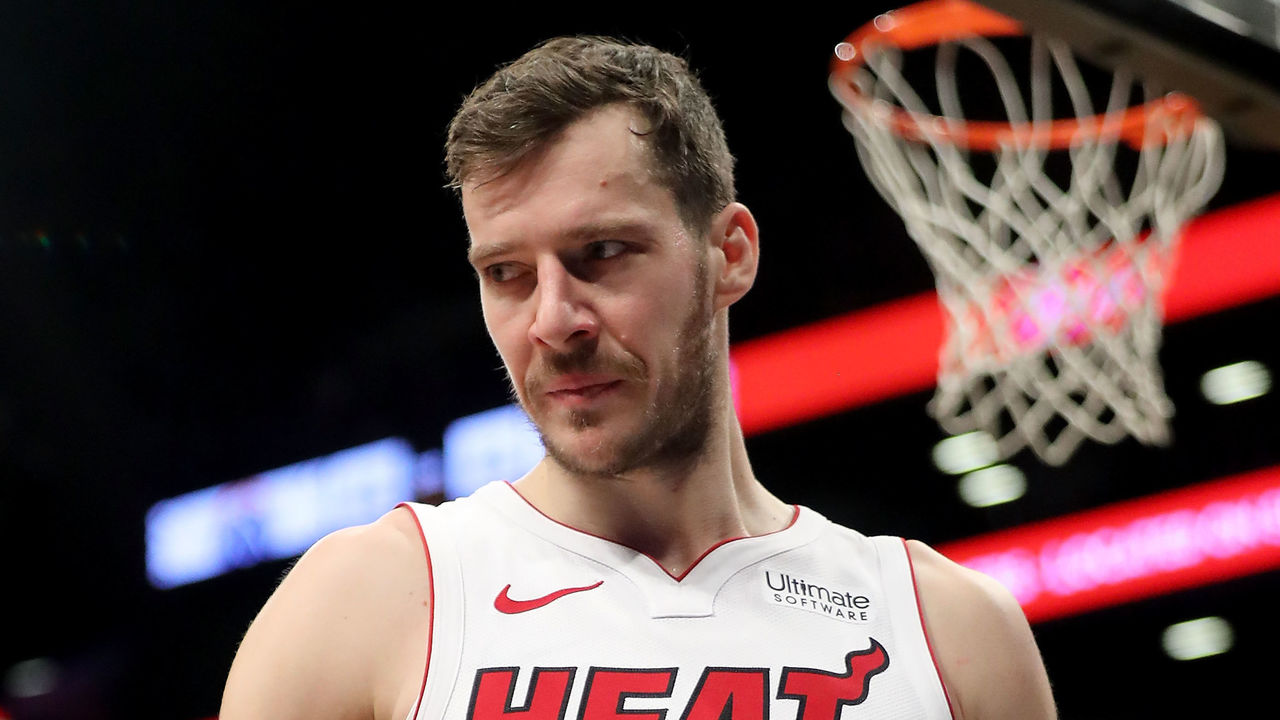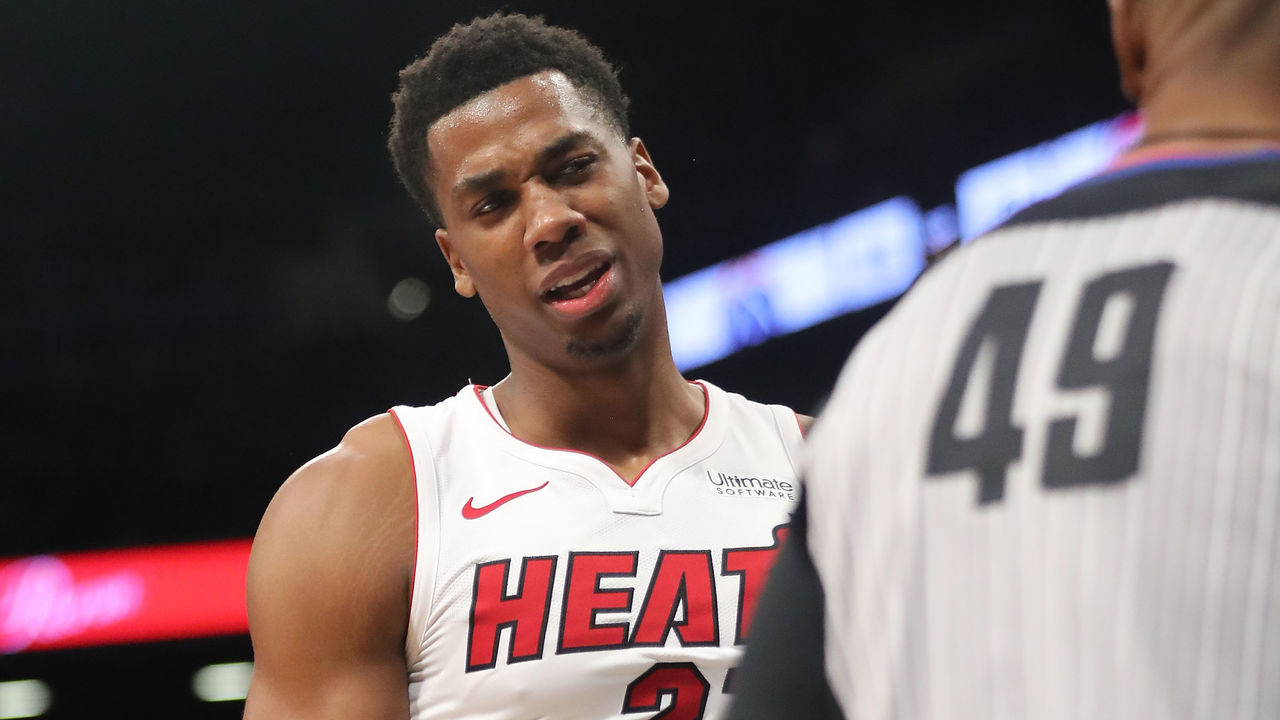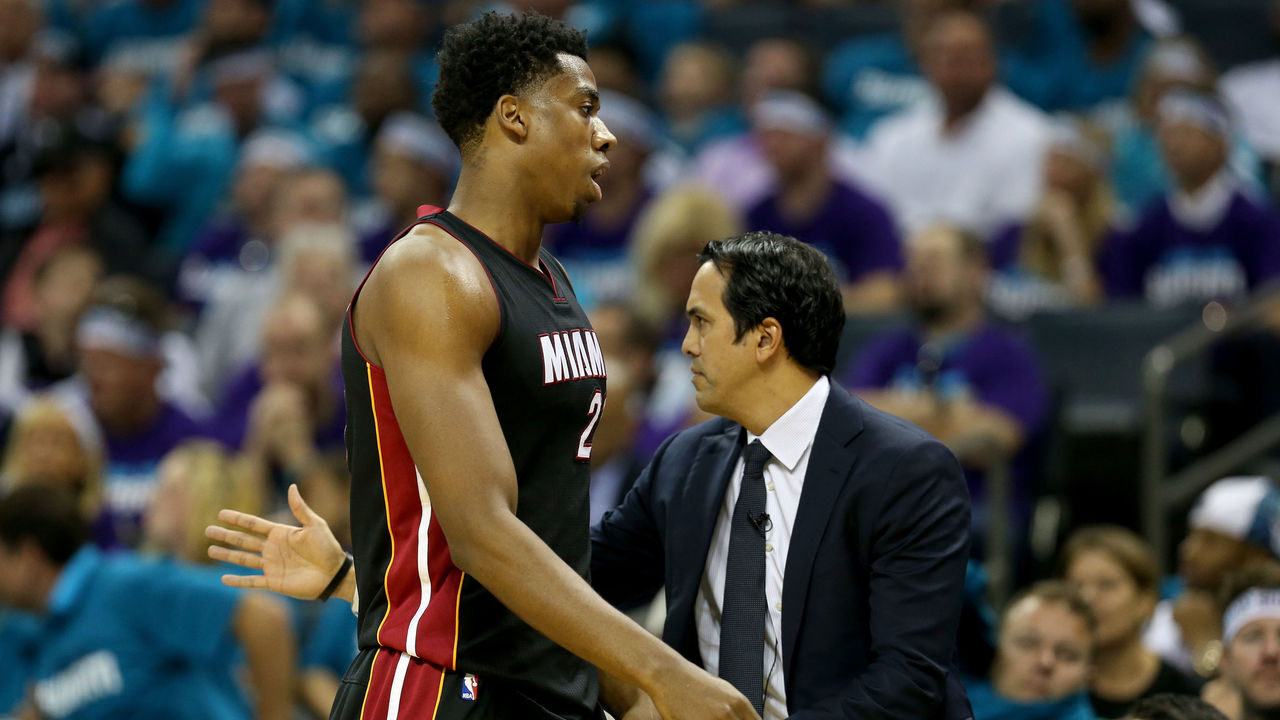Better Luck Next Year: Miami Heat edition
As NBA teams are officially eliminated from title contention, theScore NBA freelance writer Andrew Unterberger takes a look back at the highs and lows of their season, along with the biggest questions ahead of 2018-19. The 16th edition focuses on the Miami Heat.
The Good

Goran Dragic's first All-Star appearance. This wasn't about Dragic having an exceptional season as much as it was about the East suffering a spate of injuries and Miami being too good not to have some kind of representation. But that itself was a compliment to both Miami and Dragic, who served as the closest thing to the Heat's on-court leader with his 17 points and five assists a game, and their deadliest one-on-one option for most of the season when it got down to winning time. Even if it was more of a lifetime achievement designation, the All-Star appearance was long overdue for the Dragon, and not one likely begrudged by anyone (except Ben Simmons).
Defense and pace. Miami combined one of the NBA's 10 stingiest defenses with one of its five slowest paces to make every game a guaranteed slog, resulting in very un-2018 sequences like a five-game stretch in late January where the Heat neither gave up or scored 100 points once. The system worked for Erik Spoelstra's crew, however, whose physicality, discipline, and work ethic made grinding out games a viable strategy. The team outperformed its point differential and won at least one game against every Eastern Conference playoff team this regular season.
Dwyane Wade's return. Look at the numbers, and Wade's comeback doesn't seem all that impressive: 12-3-3 on 41 percent shooting in 21 minutes a night off the bench for the Heat. But that undersells the confidence that having No. 3 back on the court seemed to instill in Miami, and how effective he could still be in late-game situations. Just ask the Sixers, whom he slayed almost single-handedly in a to-the-wire regular-season matchup, and then again in similar back-breaking fashion in Game 2 of their first-round series - Miami's lone playoff win. In fact, Wade was arguably the Heat's most reliable offensive option all series, averaging 17-4-4 in just 25 minutes a night, and invariably getting the ball down the stretch.
Wayne Ellington's historic season. The Heat didn't ask former NCAA Final Four Most Outstanding Player Wayne Ellington to do a ton in his ninth NBA season: mostly just to come out firing off the bench every night. Ellington obliged, taking nearly eight triples per game and converting an impressive 39 percent of them, resulting in his best scoring season as a pro (11.2 PPG) and a spot in the NBA record books. He made both the most threes ever by a Heat player and the most ever by any player in a reserve role with 227. It was necessary volume shooting for Miami, too, whose second-most prolific gunner (Josh Richardson) came 100 short of Ellington's total.
Depth. You could spend all day talking about the positive roster developments for the Heat - we haven't even touched on Justise Winslow's third-year breakout, Kelly Olynyk's fantastic fit in his first Miami season, or Bam Adebayo's strong rookie play - but the real story of the season for Miami was depth. At their best, the team went a legitimate 11 players deep, allowing for virtually no letup when its starters were replaced with reserves. While the Heat's top-end talent often left them at a disadvantage against the East's elite, their depth ensured they were never outclassed for a full game, consistently proving one of the conference's toughest outs.
The Bad

Hassan Whiteside, unplayable malcontent. It's always been a give-and-take with the mercurial Whiteside. He has historically provided prolific production with elite efficiency, but advanced stats show he may still be a net negative on the court. This year was no different for the center - excellent stats, poor on-off splits, a lot of minutes on the bench in the fourth quarter - until the playoffs, when even his superficial numbers cratered. Against Philly, he was neutralized, averaging five points and six boards per game, with more total turnovers (12) than field goals (nine) in the series. Whiteside, of course, took no responsibility for his poor production, instead grousing about his relative lack of PT: "At least give me a chance to fight."
The Dion Waiters injury. One remarkable thing about Miami's depth this season was that the roster lost Waiters, one of its primary cogs, for the season to ankle surgery back in January. He had emerged as one of the Heat's best volume shooters and a go-to option down the stretch, particularly before the team brought Wade back home from Cleveland. His absence hurt - especially in the playoffs, when Miami could've used his creation to put pressure on the Sixers' defense - though, again, few teams were as prepared overall to deal with the loss as the loaded Heat.
Fourth-quarter playmaking. The Heat were outscored by a 39-point margin in their playoff series with the Sixers, losing the fourth quarter four out of five times. The primary reason for the disadvantage was Miami's late-game offensive stagnancy, as the team went iso-heavy and seemed to wear itself out, resulting in a 14-point fourth in Game 3 and a 19-point final frame in Game 4 - both losses. The team lacked primary playmaking in both the regular season and postseason, sharing the ball fairly well but not having a single player average even five assists a game.
Contract spikes for next year. The Heat have some key players approaching free agency in the summer in Ellington and Wade, but their ability to retain or replace them will be hamstrung by their cap situation. Though the team was already over the luxury tax with their $131-million payroll this year, that will skyrocket to $147 million next year even without Wade or Whiteside, thanks to the rookie extension kicking in for formerly dirt-cheap wing Josh Richardson and the poison pill contract signed with Brooklyn (and matched by Miami) for point guard Tyler Johnson, which leaps from $6 million to $19 million next year. The Heat also have no first-round draft pick this year, handing it over to Phoenix in 2015's Dragic trade, meaning any improvements for next season will have to come internally.
Tough playoff draw. You have to wonder if the Heat regret battling back to win their final game of the season against Toronto in overtime, pushing them up to the East's sixth seed and a first-round matchup with Philadelphia. The Sixers, of course, had won 16 straight going into the postseason, and despite missing franchise player Joel Embiid for the first two games of the series, entered their matchup as arguably the most dangerous team in the East. Given how much more headway the Bucks and Wizards have made in their own first-round matchups against Boston and Toronto, respectively, as the seventh and eighth seeds, Miami might be kicking itself.
The Questions

Can the Whiteside relationship be salvaged? By the end of the Philly series, Spoelstra and Whiteside seemed to want nothing to do with one another. And with Adebayo proving less prodigious but more trustworthy with his play at the pivot, it's easy to see a split on the horizon. However, Whiteside is still owed a whopping $25 million next year and has a player option for $27 million the year after. Will the Heat figure out a way to make it work for the next two years with their disgruntled center? Or could they possibly find a way out from under his gargantuan contract?
Who are the starting five next year? The downside to having 10 or more viable pros on your roster is that you have to figure out what to do with all of them. It's not immediately clear who the best starting five for Miami are - especially with Waiters returning from injury - and Spo may have to do some juggling to figure it out. (For the record, the Heat's first five for the playoffs - Dragic, Richardson, Tyler Johnson, James Johnson, and Whiteside - were outscored by more than 30 points per 100 possessions over the course of about 43 minutes in five games against Philly.)
Will Wade return? He's made it pretty clear it's Miami or bust for him at this point - but at age 36, and with the Heat's rotation already well-stocked with younger wings who demand minutes, "bust" is a viable option for the future Hall of Famer. Of course, his Western Conference analog, Manu Ginobili, is four years older and still kicking, and Wade was brilliant enough against Philly in the playoffs to prove he's still got plenty left in the tank, so there's no real need for him to go gently into that good night if he's feeling unsatisfied.
How does this team get to the next level? There's no cap maneuverability for Miami, and not a ton of tradeable contracts, which means if they want to fare better than a first-round playoff exit, the improvement will likely have to come from within. But that's easier said than done with this roster, which is already built around a number of overachievers outplaying their draft slot and/or journeyman status, and whose most accomplished players (Dragic and Wade) are in their 30s. Maybe Winslow continues on a Kawhi Leonard evolutionary path, or maybe Olynyk fully realizes the Dirk Nowitzki comparisons some optimists made for him early in his NBA career, but otherwise, "tough first-round out" seems to be the ceiling for this squad.
Is this team worth $147 million? A team that appears - for the moment, at least - to have a second-round ceiling might not be the kind of team that owner Micky Arison and Co. feel like going deep into the luxury tax for. But that's what they'll have to do to keep this core together next season, before even thinking about dipping into free agency or re-signing their own guys. Will a medium-level teardown be in store for this summer? Or, if they don't show clear signs of leveling up early next season, will a Marlins-style fire sale begin in Miami before the trade deadline?
(Photos courtesy: Getty Images)